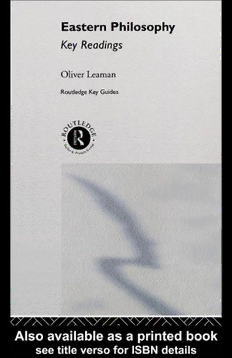Table Of ContentEASTERN PHILOSOPHY:
KEY READINGS
Eastern Philosophy: Key Readings draws together extracts from a wide range
of primary and secondary sources, which cover the many branches of Eastern
philosophy and religion. Quotations are arranged under concept headings,
and open up the debates on topics such as zen, yin-yang and daoism, as
well as offering an overview of Eastern philosophical perspectives on subjects
such as happiness, war and imagination.
Material is drawn not only from such cornerstone texts as the Bhagavad
Gita and the Lao-tzu, but also from modern writings on Eastern philosophy
and religion. Extracts are prefaced by Oliver Leaman’s succinct introductions,
and supplemented by a glossary of terms, all of which make this a unique
and accessible way into a fascinating discipline.
Oliver Leaman is Professor of Philosophy at Liverpool John Moores
University. He is the author of Key Concepts in Eastern Philosophy.
ROUTLEDGE KEY GUIDES
Ancient History: Key Themes and Approaches
Neville Morley
Cinema Studies: The Key Concepts (Second edition)
Susan Hayward
Eastern Philosophy: Key Readings
Oliver Leaman
Fifty Contemporary Choreographers
edited by Martha Bremser
Fifty Eastern Thinkers
Diané Collinson, Kathryn Plant and Robert Wilkinson
Fifty Key Contemporary Thinkers
John Lechte
Fifty Key Thinkers in International Relations
Martin Griffiths
Fifty Key Thinkers on History
Marnie Hughes-Warrington
Fifty Major Economists
Steven Pressman
Fifty Major Philosophers
Diané Collinson
Key Concepts in Communication and Cultural Studies (second edition)
Tim O’Sullivan, John Hartley, Danny Saunders, Martin Montgomery and John Fiske
Key Concepts in Cultural Theory
edited by Andrew Edgar and Peter Sedgwick
Key Concepts in Eastern Philosophy
Oliver Leaman
Key Concepts in Language and Linguistics
R.L.Trask
Key Concepts in the Philosophy of Education
John Gingell and Christopher Winch
Key Concepts in Popular Music
Roy Shuker
Key Concepts in Post-Colonial Studies
Bill Ashcroft, Gareth Griffiths and Helen Tiffin
Post-Colonial Studies: The Key Concepts
Bill Ashcroft, Gareth Griffiths and Helen Tiffin
Social and Cultural Anthropology: The Key Concepts
Nigel Rapport and Joanna Overing
EASTERN
PHILOSOPHY:
KEY READINGS
Oliver Leaman
London and New York
First published 2000
by Routledge
11 New Fetter Lane, London EC4P 4EE
Simultaneously published in the USA and Canada
by Routledge
29 West 35th Street, New York, NY 10001
Routledge is an imprint of the Taylor & Francis Group
This edition published in the Taylor & Francis e-Library, 2002.
© 2000 Oliver Leaman
All rights reserved. No part of this book may be reprinted or
reproduced or utilized in any form or by any electronic, mechanical,
or other means, now known or hereafter invented, including
photocopying and recording, or in any information storage or
retrieval system, without permission in writing from the publishers.
British Library Cataloguing in Publication Data
A catalogue record for this book is available from the British Library
Library of Congress Cataloging in Publication Data
A catalogue record for this book has been requested
ISBN 0-415-17357-4 (hbk)
ISBN 0-415-17358-2 (pbk)
ISBN 0-203-0-203-01095-7 Master e-book ISBN
ISBN 0-203-17940-4 (Glassbook Format)
In fond memory of Catherine Tanner
CONTENTS
Preface ix
Acknowledgements xii
List of Entries 1
List of Entries and their Sources 5
References 290
Glossary 294
Guide to Further Reading 305
PREFACE
The whole concept of ‘Eastern’ philosophy is rather an artificial one,
since there are difficult issues in defining where ‘East’ starts and ends.
Some of the thinkers included here operated pretty far in the ‘West’
(ibn Rushd, for example, spent his life in Spain and North Africa). I
decided to include Islamic philosophy since much of it took place and
continues to be important in what is clearly the Asian world. On the
other hand, a good deal of ‘Western’ philosophy is an important part of
the philosophical curriculum in much of Asia today, and it could then
be argued that this should also be classified as Eastern philosophy. I
certainly would not want to argue that there is anything specifically
different about Eastern as compared with Western philosophy, although
there have been arguments which have gone in this direction. The
cultural context in which different philosophical traditions arose clearly
mark them in an important way, but many of the issues which different
traditions discuss are remarkably similar to each other. I have taken
Eastern philosophy to include Islamic, Zoroastrian, Chinese, Japanese,
Tibetan, Korean and Indian philosophies, and I have selected here a
sample from all these traditions.
Eastern philosophy, however that is defined, is a very substantial
group of systems of thought, and we have only skimmed the surface
here of its richness and diversity. Each of the terms which is given an
entry is in itself a highly developed concept within a particular type
of philosophy, or philosophies, and there are shelves in libraries on
each such term. There is no way that this book could be anything
more than indicative at best. I have had to exclude a lot of important
terms because I wanted to allow those terms which do appear to
have sufficient length to demonstrate a flavour of what they can do.
The point of this book is to make available a sample of interesting
arguments and claims by a variety of philosophical traditions which
will be relatively unfamiliar to many readers. The book will not have
ix

